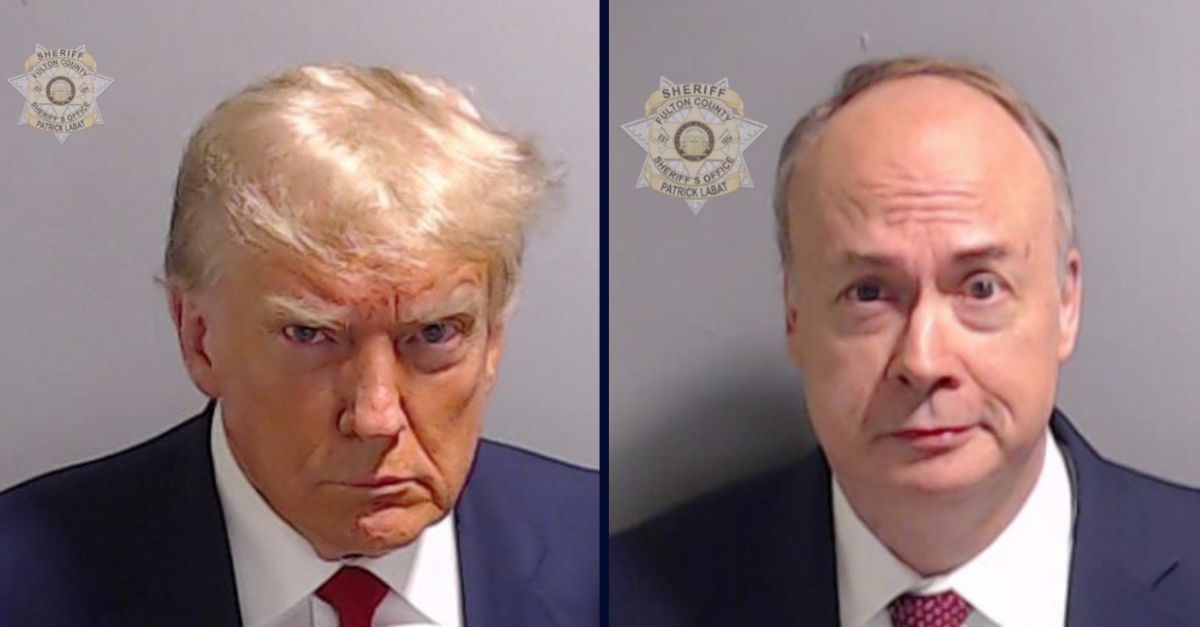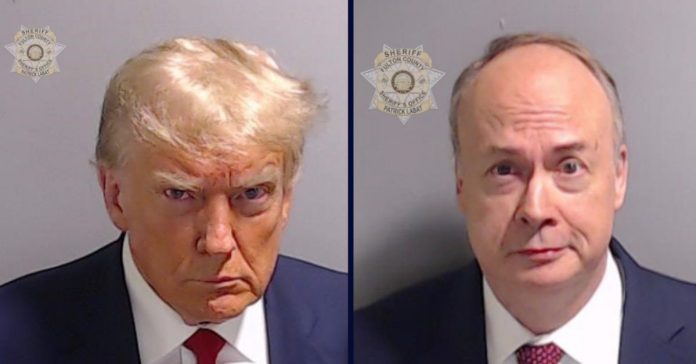
Left: Former President Donald Trump appears in a booking photo; Right: Jeffrey Clark appears in a booking photo. (Fulton County Sheriff’s Office)
Former U.S. Department of Justice attorney Jeffrey Clark lost a bid to delay attorney disciplinary hearings over his efforts to help Donald Trump overturn the results of the 2020 presidential election, an appellate court in Washington, D.C., ruled Tuesday morning.
The D.C. Bar Office of Disciplinary Counsel filed ethics charges against Clark in July 2022. Those proceedings have been paused for several months as the result of various appeals. Clark motioned to have the case against him removed to a federal court in October 2022. A federal judge denied that request in June 2023 in an opinion finding federal courts have no jurisdiction over attorney licensing disputes.
In November 2023, the board overseeing the professional misconduct case rescheduled the proceedings to begin in January. Clark was able to pause that order once again, by filing a motion to stay with the U.S. Court of Appeals for the District of Columbia in December 2023. A three-judge panel, however, made up of two Trump-appointed judges (Neomi Rao and Gregory Katsas) and one Joe Biden-appointed judge (Brad Garcia) declined to further delay the long-running ethics case.
“Appellant has not shown that intervening developments warrant reconsideration of the denial of a stay pending appeal,” the panel ruled in their terse, one-page order denying the stay.
Clark, in his nine-page motion to stay, argued that “two important developments” merited the court’s reconsideration of previously denied stay requests filed in October 2023. Both developments related to special counsel Jack Smith’s criminal prosecution of Trump for conspiring to overturn the results of the 2020 election.
Clark’s Dec. 14, 2023 motion for a stay first cites Trump’s motion for a stay pending appeal concerning whether he has presidential immunity from the federal criminal case. Secondarily, Clark cited Smith’s since-failed effort to have the U.S. Supreme Court directly rule on the issue of Trump’s alleged immunity — by skipping over the appeals court process.
“These two developments warrant this Court taking a fresh look at Mr. Clark’s arguments for an automatic stay,” the motion argued.
The basis of Clark’s argument was that D.C. District Court Judge Tanya Chutkan recently relied on a set of factors from two separate U.S. Supreme Court decisions in order to automatically stay district court proceedings against Trump in the federal election subversion case.
“The same logic applies here,” Clark’s latest motion to stay argued. “The issue in Mr. Clark’s appeal is precisely ‘whether the litigation may go forward in the district court’ (depending here on whether the case was properly removed or not).”
The appeals court did not analyze Clark’s arguments in their order.
On Dec. 22, 2024, the nation’s high court rejected Smith’s efforts to obtain “immediate review” of Trump’s immunity claim.
On Tuesday morning, a three-judge panel of the D.C. Court of Appeals unanimously ruled that Trump is not immune from criminal indictment on the four felony charges he faces in the district for his “alleged efforts to remain in power despite losing the 2020 election.”
The disciplinary charges Clark faces by D.C.’s legal ethics board are directly related to those same election overthrow efforts.
Clark is an environmental lawyer whom Trump nearly tapped to be acting attorney general in his waning scramble to retain the presidency. He previously worked as a former assistant attorney general at one sub-agency within the DOJ and an acting assistant attorney general within another. His bar charges are focused on an unsent draft letter falsely claiming the department “identified significant concerns that may have impacted the outcome of the election in multiple states, including the state of Georgia.”
The specification of charges said that Clark violated D.C. Rules of Professional Conduct 8.4(a) and (c) (“in that respondent attempted to engage in conduct involving dishonesty, by sending the proof of concept letter containing false statements”) and Rules 8.4(a) and (d) (“in that respondent attempted to engage in conduct that would seriously interfere with the administration of justice”). The so-called “proof of concept letter” is the draft Clark compiled that would have urged legislatures in states where Trump lost to “send an unauthorized slate of electors to Congress,” according to the charges.
In late January 2023, the 45th president and likely GOP 2024 presidential nominee telegraphed his intent to interject himself into Clark’s D.C. ethics case — by way of a letter sent by Trump attorney Todd Blanche. In that letter sent to Clark, the former president aims to stop his onetime DOJ underling from sharing details of conversations they had in the waning days of the 45th presidential administration.
“In light of these circumstances and the pending D.C. Bar disciplinary proceeding against you, which is set to begin before Hearing Committee #12 on March 26, 2024,” the letter reads, “we hereby instruct you to maintain President Donald Trump’s executive privilege and other related privileges, including law enforcement privilege, attorney client privilege, and deliberative process privilege.”
Clark is also a co-defendant, accused of two counts, in the sprawling, 98-page, 41-count criminal indictment filed by Fulton County prosecutors against Trump and others in August 2023. A recent effort to delay his case in the Peach State was rejected late last month.
Have a tip we should know? [email protected]

